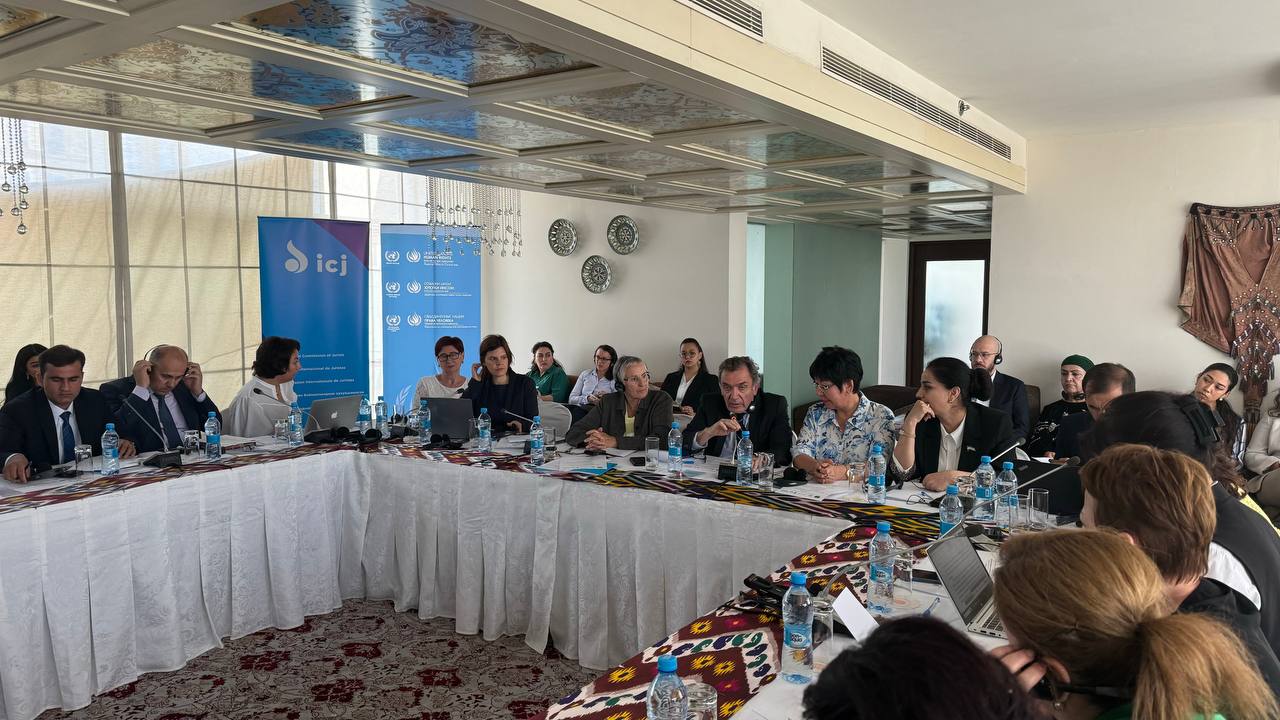From 16 to 19 September 2024, the International Commission of Jurists (ICJ) conducted a mission to Tajikistan, focusing on improving access to justice for women survivors of gender-based violence (GBV). The mission was organized in collaboration with the Regional Office for Central Asia (ROCA) of the Office of the High Commissioner for Human Rights (OHCHR) and with the national organisation Rights and Prosperity in Tajikistan.
The ICJ delegation included ICJ Commissioner Patricia Schulz, a former member of the Committee on the Elimination of Discrimination against Women (CEDAW), ICJ Secretary General Santiago Canton, and senior ICJ staff members.
During the mission, ICJ representatives met civil society organizations, gender equality experts, State officials, members of the Parliament, judges, lawyers and international organizations’ officials to discuss the challenges and opportunities in addressing GBV against women in Tajikistan. These meetings provided valuable insights into the systemic barriers women survivors of GBV face in accessing justice.
Tajikistan’s societal attitudes, harmful gender stereotypes and ingrained discriminatory prejudices pose significant barriers to women’s access to justice. This mindset perpetuates widespread violence, with men typically the perpetrators and women the victims. Women who attempt to leave abusive situations often face societal pressure to reconcile with their abuser, instead of seeking a divorce or justice, and end up enduring additional victim-blaming and shame.
Domestic legal practices continue to lag behind international human rights law obligations, which set universal standards for States to address GBV. Moreover, there is a lack of awareness and training among legal professionals regarding States’ international human rights law obligations concerning GBV.
The ICJ mission confirmed the judiciary’s important role, particularly the Supreme Court’s, in addressing GBV. Judicial independence and sensitivity to gender issues are crucial in ensuring that survivors of GBV receive justice. Although Tajikistan is a party to the Convention on the Elimination of All Forms of Discrimination against Women and to other international human rights treaties, judges and lawyers rarely apply or cite international human rights standards in judicial proceedings.
When seeking assistance from justice authorities, women frequently encounter additional obstacles, including lack of access to legal aid. Furthermore, there is an inadequate number of shelters for GBV survivors in Tajikistan, with most existing facilities run by NGOs being dependent on external funding.
In the course of the mission, ICJ representatives identified additional specific concerns, such as the inadequate availability of open and accessible data and statistics on GBV, making it difficult to address the true scale of the problem. As a result, effective policymaking is hindered.
Moreover, the shrinking space for civil society exacerbates the difficulties faced by women survivors when seeking protection and justice. Restrictions on non-governmental organizations reduce support services available to survivors and impede progress towards legal reforms necessary to protect women’s human rights.
The ICJ mission formed part of the “WEMJUST project”, supported by the European Union, which aims to improve access to justice for women survivors of GBV in Central Asia.
The ICJ expresses its appreciation to the OHCHR ROCA and all organizations and individuals who contributed to the mission, including State bodies, officials, civil society groups and international partners.
Additional information:
During the mission, an Expert Roundtable was held on 18-19 September, focusing on access to justice for women in Tajikistan. This roundtable, co-hosted by Rights and Prosperity, OHCHR ROCA, and the Supreme Court of Tajikistan, convened representatives from the judiciary, law enforcement agencies, legal professionals, civil society and international experts. The event provided a platform for an open dialogue on improving legal frameworks, judicial practices and support mechanisms for GBV survivors.
The ICJ will issue a detailed report outlining its findings and recommendations.
For more information please contact: Karolína Babická, karolina.babicka@icj.org, or Temur Shakirov, temur.shakirov@icj.org





